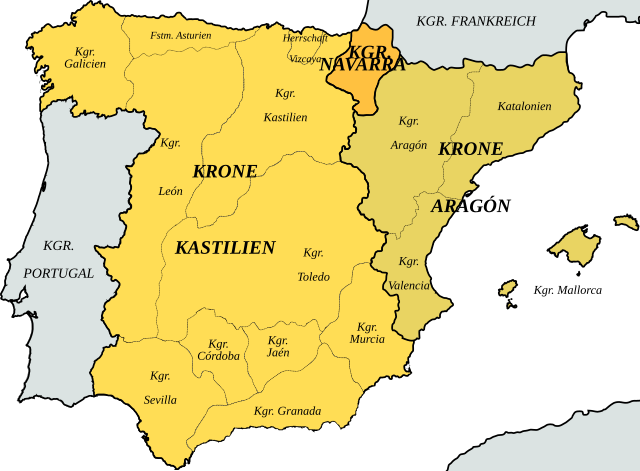Miguel da Paz, Hereditary Prince of Portugal and Prince of Asturias (Portuguese: Miguel da Paz de Trastâmara e Avis, Portuguese pronunciation: [miˈɣɛl dɐ ˈpaʃ]; Spanish: Miguel de la Paz de Avís y Trastámara, "Michael of Peace") (23 August 1498 – 19 July 1500) was a Portuguese royal prince, son of King Manuel I of Portugal and his first wife, Isabella of Aragon, Princess of Asturias (1470–1498).[1]
| Miguel da Paz | |
|---|---|
| Hereditary Prince of Portugal, Prince of Asturias and Prince of Girona | |
 | |
| Born | 23 August 1498 Zaragoza |
| Died | 19 July 1500 (aged 1) Granada |
| Burial | Capilla Real, Granada |
| House | Aviz |
| Father | Manuel I of Portugal |
| Mother | Isabella, Princess of Asturias |

Life and death
Miguel da Paz was born in Zaragoza, Spain on 23 August 1498.[1] His mother, Isabella of Aragon, died within an hour of his birth. He was shortly sworn heir to the various Iberian crowns by the courts of Portugal, Castile and Aragon.[1] For the next two years, he was the recognized heir of his father's kingdom of Portugal and of the kingdoms of Castile, León and Aragon, which he would inherit from his grandparents, Ferdinand II of Aragon and Isabella I of Castile.[2] As such, he was styled Prince of Portugal, Prince of Asturias and Prince of Girona.
Miguel died in Granada on 19 July 1500, in his grandmother's arms.[3] He was buried in the Capilla Real, in Granada.
In October 1500, Miguel's father married Maria of Aragon, who was also the younger sister of Miguel's mother. Maria gave birth to Manuel's eventual successor, John III and to several other children.[4]
The hopes of Isabella I and Ferdinand II to unite all of the Iberian kingdoms vanished with Miguel's death.[1] His aunt Joanna inherited Castile, León and Aragon, and it was her grandson Philip II who established a short-lived Iberian Union.
Ancestry
| Ancestors of Miguel da Paz, Prince of Portugal | ||||||||||||||||||||||||||||||||||||||||||||||||||||||||||||||||||||||||||||||||||||||||||||||||||||||||||||||||||||||||||||||||||||||||||||||||||||||||||||||||||||||||||||||||||||||||||||||||||||||||||||||||||||||||||||||||||||||||||||||||||||||||||||||||||||||||||||||||||||||||||||||||||||||||||||||||||||||||||||||||||||||||||||||||||||||||||||||||||||||||||||||||||||||||||||||||||||||||||||||||||||||||||||||||||||||||||||||||||||||||||||||||||||||||||||||||||||||||||||||||||||||||||||||||||||||||||||||||||||||||||||||||||||||||||||||||||||||||||||||||||||||||||||||||||||||||||||||||
|---|---|---|---|---|---|---|---|---|---|---|---|---|---|---|---|---|---|---|---|---|---|---|---|---|---|---|---|---|---|---|---|---|---|---|---|---|---|---|---|---|---|---|---|---|---|---|---|---|---|---|---|---|---|---|---|---|---|---|---|---|---|---|---|---|---|---|---|---|---|---|---|---|---|---|---|---|---|---|---|---|---|---|---|---|---|---|---|---|---|---|---|---|---|---|---|---|---|---|---|---|---|---|---|---|---|---|---|---|---|---|---|---|---|---|---|---|---|---|---|---|---|---|---|---|---|---|---|---|---|---|---|---|---|---|---|---|---|---|---|---|---|---|---|---|---|---|---|---|---|---|---|---|---|---|---|---|---|---|---|---|---|---|---|---|---|---|---|---|---|---|---|---|---|---|---|---|---|---|---|---|---|---|---|---|---|---|---|---|---|---|---|---|---|---|---|---|---|---|---|---|---|---|---|---|---|---|---|---|---|---|---|---|---|---|---|---|---|---|---|---|---|---|---|---|---|---|---|---|---|---|---|---|---|---|---|---|---|---|---|---|---|---|---|---|---|---|---|---|---|---|---|---|---|---|---|---|---|---|---|---|---|---|---|---|---|---|---|---|---|---|---|---|---|---|---|---|---|---|---|---|---|---|---|---|---|---|---|---|---|---|---|---|---|---|---|---|---|---|---|---|---|---|---|---|---|---|---|---|---|---|---|---|---|---|---|---|---|---|---|---|---|---|---|---|---|---|---|---|---|---|---|---|---|---|---|---|---|---|---|---|---|---|---|---|---|---|---|---|---|---|---|---|---|---|---|---|---|---|---|---|---|---|---|---|---|---|---|---|---|---|---|---|---|---|---|---|---|---|---|---|---|---|---|---|---|---|---|---|---|---|---|---|---|---|---|---|---|---|---|---|---|---|---|---|---|---|---|---|---|---|---|---|---|---|---|---|---|---|---|---|---|---|---|---|---|---|---|---|---|---|---|---|---|---|---|---|---|---|---|---|---|---|---|---|---|---|---|---|---|---|---|---|---|---|---|---|---|---|---|---|---|---|---|---|---|---|---|---|---|---|---|---|---|---|---|---|---|---|---|---|---|---|---|---|---|---|---|---|---|---|---|---|---|---|---|---|---|---|---|---|---|---|---|---|---|---|---|---|---|---|---|---|---|---|---|---|---|---|---|---|---|---|---|---|---|---|---|---|---|---|---|---|---|---|---|---|---|---|---|---|---|---|---|---|---|---|---|---|---|---|---|---|---|---|---|---|---|---|---|---|---|---|---|---|---|---|---|---|---|---|---|---|---|---|---|---|---|---|---|---|---|---|---|---|---|---|---|---|---|---|---|---|
| ||||||||||||||||||||||||||||||||||||||||||||||||||||||||||||||||||||||||||||||||||||||||||||||||||||||||||||||||||||||||||||||||||||||||||||||||||||||||||||||||||||||||||||||||||||||||||||||||||||||||||||||||||||||||||||||||||||||||||||||||||||||||||||||||||||||||||||||||||||||||||||||||||||||||||||||||||||||||||||||||||||||||||||||||||||||||||||||||||||||||||||||||||||||||||||||||||||||||||||||||||||||||||||||||||||||||||||||||||||||||||||||||||||||||||||||||||||||||||||||||||||||||||||||||||||||||||||||||||||||||||||||||||||||||||||||||||||||||||||||||||||||||||||||||||||||||||||||||
References
Bibliography
Wikiwand in your browser!
Seamless Wikipedia browsing. On steroids.
Every time you click a link to Wikipedia, Wiktionary or Wikiquote in your browser's search results, it will show the modern Wikiwand interface.
Wikiwand extension is a five stars, simple, with minimum permission required to keep your browsing private, safe and transparent.
